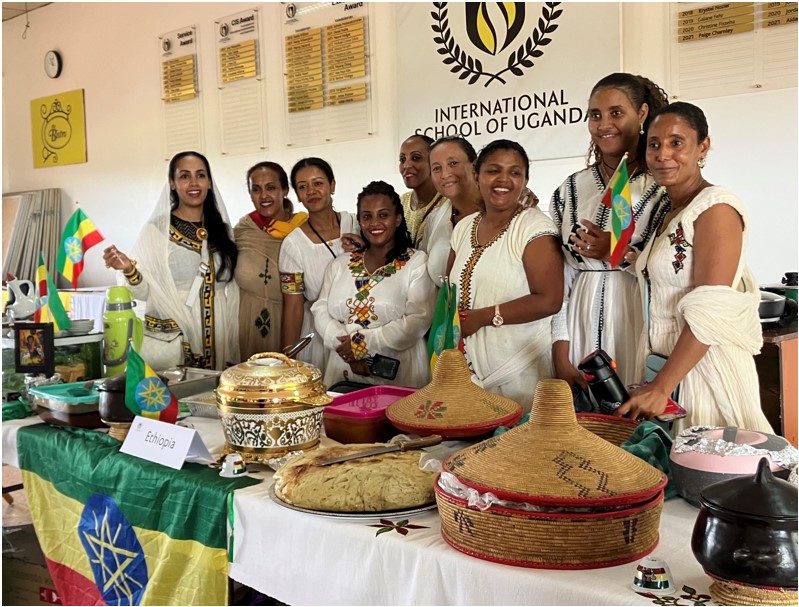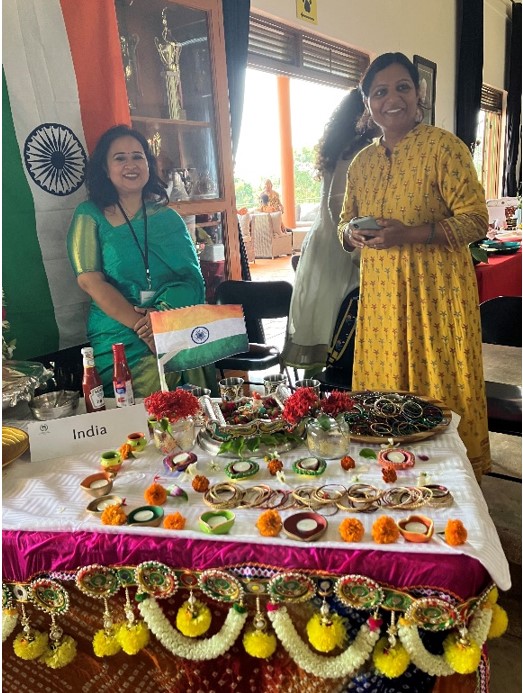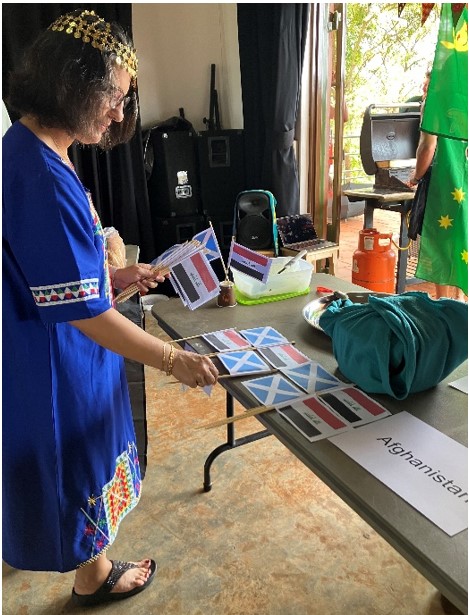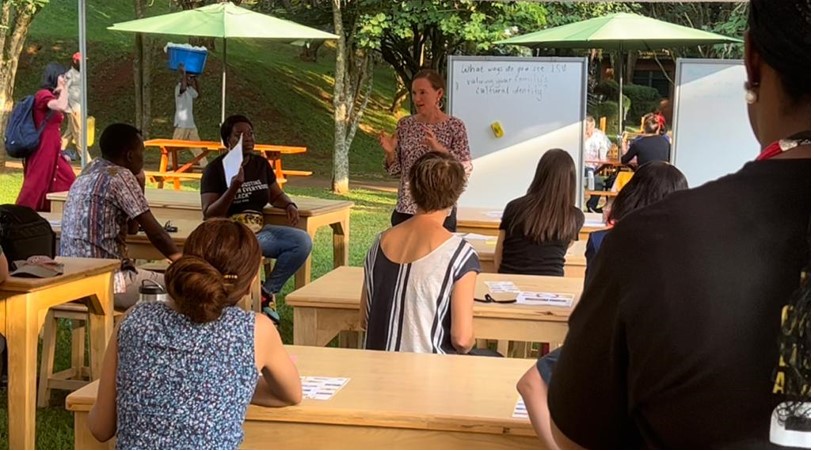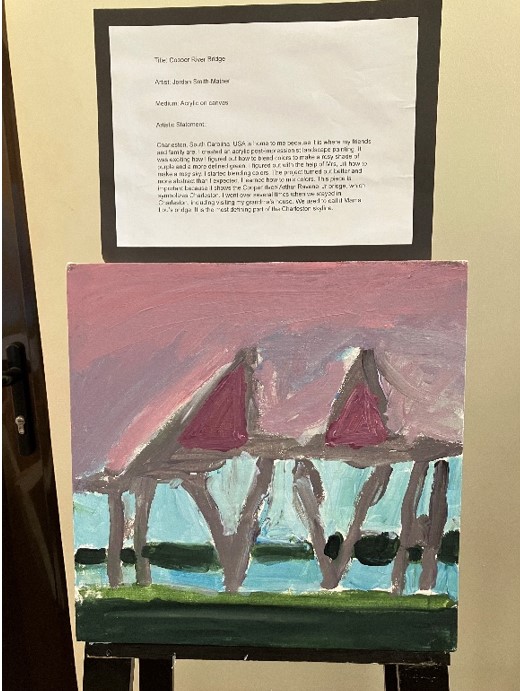A Letter from Shelvis and Nancy Smith-Mather, serving in South Sudan and the United Kingdom
Spring 2023
Write to Shelvis Smith-Mather
Write to Nancy Smith-Mather
Individuals: Give online to E132192 in honor of Shelvis & Nancy’s ministry
Individuals: Give online to 052032 for RECONCILE
Congregations: Give to D500115 in honor of Shelvis & Nancy’s ministry
Churches are asked to send donations through your congregation’s normal receiving site (this is usually your presbytery)
Subscribe to our co-worker letters
Dear friends,
There is something invigorating and awe-inspiring about watching people and institutions operate in their strengths. I witnessed my kids’ school in such a moment at Friday’s annual Festival of World Cultures. The scene will remain etched in my mind as a beautiful picture of people sharing and learning about one another’s cultures.
Families spent hours cooking for the event. The tables, labeled by country, held feasts and displayed flags. Parents and children proudly donned their unique, traditional clothes. Behind the bowls and trays of food stood parents, eager to serve, ready to offer something of personal value to the larger school community.
When walking through the campus early that Friday morning, I overheard a high school student talking to friends. “It was all I could think to wear,” she explained, looking down at her baseball jersey. “What is American?” she then asked, trying to think of our traditional clothing.
“I didn’t know what to cook,” a teacher told me, as she carried a bag towards the dining hall. “What food is really American?” she pondered. “I don’t like apple pie,” she continued, “so, I just made deviled eggs. That’s American, right?”
Before the big lunch festival, parents gathered for a forum on cultural identity. Though I was nervous about unintentionally offending someone, I volunteered to co-facilitate the gathering.“What parts of your cultural identity do you want to pass down to your children?” I asked parents to share with one another. At the end, we reflected on ways to support the school in valuing a variety of cultural identities. Students from over 50 countries attend the school.
After the parent forum, one U.S. mom pulled me aside. Then, she began to think aloud about what to teach her own children about culture. “What is American culture?” she wondered.
A student assembly came between the parent forum and the grand lunch gathering. Excited to be one of four student MCs, our son Jordan introduced himself to the audience in both English and Spanish. Then, the drama group acted out a Kenyan legend. Ugandan acrobats flipped across the stage. Some of the youngest elementary students danced to Louis Armstrong’s “What a wonderful world,” while high school students sang the lyrics in various languages.
Outside the assembly gathering, the fifth graders’ art exhibition displayed each artist’s depiction of “home.” In an impressionistic style, Jordan’s painting featured the bridge over the Cooper River. By the canvas, he wrote, “Charleston, South Carolina, USA is home to me because it is where my friends and family are.”
Near Jordan’s piece, stood a surprised American mother looking at a painting of Utah. “My kids don’t actually talk about the U.S. as home,” she commented. “We have always lived overseas.”
The pandemic caused our children, to see the USA as their “home.” Before that, they visited family in the States, while East Africa remained “home.” Strengthening their connection to the U.S. and to relatives was a silver lining of the challenging pandemic years.
The poignant questions raised by my American companions on Friday made me pause.
Yes, I too struggled to know what to cook. My kids’ favorites, pizza, spaghetti and burritos, are not original American cuisine. Also, I was glad I could dress them in the colors of our flag instead of figuring out our “traditional” clothing.
Yet, concerning what to teach our kids about American culture, I found myself passionately articulating a response that went something like:
“America is a mixture of different cultures and people. And we can tell our kids, that sometimes we do a good job of living together well and sometimes we do not. As Americans, though, we have the amazing opportunity to join into a long history of trying to make it work.”
Navigating life together takes intentionality. It takes courage, honesty and perseverance. It takes really good listening and a curiosity about the experiences of others.
It means seeing clearly what has been and reimagining what can be.
Perhaps the World Festival of Cultures made me extra grateful for my multi-cultural home country. A home where native people, once stripped of lands and forced into reservations, now serve the U.S. Congress in record numbers. A home where formerly enslaved citizens lead human rights movements that inspire the world time and again. A home where immigrants and refugees sought the shores of Ellis Island in search of something greater.
Much work remains to be done, yet many citizens remain committed to uniting us into a peaceful, thriving national community. Having lived in six different countries on four different continents, I know such aspirations are challenging to achieve anywhere in the world. But we don’t give up.
That is what I want my kids to know about American culture. They will be part of defining the nation’s cultural identity in the next chapter. God, please help us prepare them well.
Thank you for your support of our family and the work we get to join in East Africa. While we miss home, we are humbled to represent a nation and a church community that continue to strive for something greater. In our shared mission, may God give us grace for ourselves and for each other. Amen.
![]() You may freely reuse and distribute this article in its entirety for non-commercial purposes in any medium. Please include author attribution, photography credits, and a link to the original article. This work is licensed under a Creative Commons Attribution-NonCommercial-NoDeratives 4.0 International License.
You may freely reuse and distribute this article in its entirety for non-commercial purposes in any medium. Please include author attribution, photography credits, and a link to the original article. This work is licensed under a Creative Commons Attribution-NonCommercial-NoDeratives 4.0 International License.
